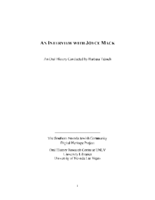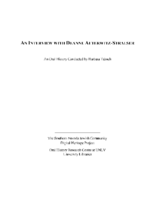Search the Special Collections and Archives Portal
Search Results

Transcript of interview with Marc Ratner by Barbara Tabach, August 23, 2016
Date
Archival Collection
Description
Marc Ratner moved to Las Vegas when he was in the seventh grade in 1957. His father became owner of a retail beauty supply business. It also was about the time Marc became a bar mitzvah. The Ratner family belonged to Temple Beth Sholom, as did everyone at the time, and a favorite memory he recalls is of sneaking a glimpse of crooner Eddie Fisher and actress Elizabeth Taylor getting married there. While growing up, Marc showed no particular interest in being a star athlete. He played little baseball and participated in track as a long jumper. Nevertheless, on the day of this oral history interview, Marc is sitting in his office surrounded by sports memorabilia. It is all a testimony, a museum highlighting his decades of officiating and regulating sports events. His stories include newsworthy boxing episodes that ranged from the infamous ?Fan Man? parachutist incident in 1963 during the Evander Holyfield vs Riddick Bowe fight at Caesars and the 1997 ?Bite Fight? when Mike Tyson took a bite out of Evander Holyfield?s ear. v In 2016, Marc was inducted into the International Boxing Hall of Fame, an extraordinary honor for a nonparticipant. He has long been a fan of the sport and talks about the first fight he ever attended, becoming a ring inspector in 1985 and then starting a new phase of his career in 2006, as Vice President of Regulatory Affairs for the Ultimate Fighting Championship [UFC]. In addition, Marc has dedicated much his life blowing the whistle at high school and college sports: he?s officiated on the football field for several conferences, bowl games and mentors would-be officials. He served as Nevada State Athletic Commission executive director for two decades. Among his community involvement is serving on the board of Jewish Family Services Agency. In 1997 he was honored by the National Council of Christians and Jews. Marc Ratner moved to Las Vegas when he was in the seventh grade in 1957. His father became owner of a retail beauty supply business. It also was about the time Marc became a bar mitzvah. The Ratner family belonged to Temple Beth Sholom, as did everyone at the time, and a favorite memory he recalls is of sneaking a glimpse of crooner Eddie Fisher and actress Elizabeth Taylor getting married there. While growing up, Marc showed no particular interest in being a star athlete. He played little baseball and participated in track as a long jumper. Nevertheless, on the day of this oral history interview, Marc is sitting in his office surrounded by sports memorabilia. It is all a testimony, a museum highlighting his decades of officiating and regulating sports events. His stories include newsworthy boxing episodes that ranged from the infamous ?Fan Man? parachutist incident in 1963 during the Evander Holyfield vs Riddick Bowe fight at Caesars and the 1997 ?Bite Fight? when Mike Tyson took a bite out of Evander Holyfield?s ear. v In 2016, Marc was inducted into the International Boxing Hall of Fame, an extraordinary honor for a nonparticipant. He has long been a fan of the sport and talks about the first fight he ever attended, becoming a ring inspector in 1985 and then starting a new phase of his career in 2006, as Vice President of Regulatory Affairs for the Ultimate Fighting Championship [UFC]. In addition, Marc has dedicated much his life blowing the whistle at high school and college sports: he?s officiated on the football field for several conferences, bowl games and mentors would-be officials. He served as Nevada State Athletic Commission executive director for two decades. Among his community involvement is serving on the board of Jewish Family Services Agency. In 1997 he was honored by the National Council of Christians and Jews. Marc Ratner moved to Las Vegas when he was in the seventh grade in 1957. His father became owner of a retail beauty supply business. It also was about the time Marc became a bar mitzvah. The Ratner family belonged to Temple Beth Sholom, as did everyone at the time, and a favorite memory he recalls is of sneaking a glimpse of crooner Eddie Fisher and actress Elizabeth Taylor getting married there. While growing up, Marc showed no particular interest in being a star athlete. He played little baseball and participated in track as a long jumper. Nevertheless, on the day of this oral history interview, Marc is sitting in his office surrounded by sports memorabilia. It is all a testimony, a museum highlighting his decades of officiating and regulating sports events. His stories include newsworthy boxing episodes that ranged from the infamous ?Fan Man? parachutist incident in 1963 during the Evander Holyfield vs Riddick Bowe fight at Caesars and the 1997 ?Bite Fight? when Mike Tyson took a bite out of Evander Holyfield?s ear. v In 2016, Marc was inducted into the International Boxing Hall of Fame, an extraordinary honor for a nonparticipant. He has long been a fan of the sport and talks about the first fight he ever attended, becoming a ring inspector in 1985 and then starting a new phase of his career in 2006, as Vice President of Regulatory Affairs for the Ultimate Fighting Championship [UFC]. In addition, Marc has dedicated much his life blowing the whistle at high school and college sports: he?s officiated on the football field for several conferences, bowl games and mentors would-be officials. He served as Nevada State Athletic Commission executive director for two decades. Among his community involvement is serving on the board of Jewish Family Services Agency. In 1997 he was honored by the National Council of Christians and Jews.
Text

Transcript of interview with Joyce Mack by Barbara Tabach, February 23, 2015
Date
Archival Collection
Description
In this interview, Joyce Mack discusses meeting her husband, Jerry Mack, in Los Angeles,their early life as a couple, and moving to Las Vegas at the suggestion of Jerry's father, Nate Mack. She discusses how Jerry met Parry Thomas and their banking and real estate investments. Mrs. Mack talks about the opening of the Thomas and Mack Center at UNLV, and the development of the strip hotels, and discusses her children.
Joyce Mack: wife to Jerry Mack and matriarch of one of the most influential families of Las Vegas history. During this oral history conversation, she begins by tracing her family ancestry from Kiev to New York to Omaha and then Los Angeles, where she was born and raised. At a UCLA fraternity party in the early 1940s, a teenage Joyce Rosenberg was swept off her feet by her older brother's friend Jerry Mack. Jerry was from Boulder City, Nevada and had attended school in Las Vegas. In 1946, the couple married and took an extended honeymoon throughout the United States and Cuba. Soon afterwards, Jerry's father Nate Mack, a businessman and real estate developer encouraged the newlyweds to come to Las Vegas. She tells of Jerry sharing his vision of the valley's future. Thus began a successful journey that traverses decades of Las Vegas history and breathtaking growth in which the Macks were active participants and leaders. Joyce recalls the people the first met, who they raised their children side-by-side with and became lasting friends. These people were other Las Vegas pioneers including the Greenspuns and mostly importantly her husband's partnership with Parry Thomas which created the Bank of Las Vegas. It was their partnership she explains that reduced the presence of the mob element. As members of the small Jewish community of the late 1940s, the Macks would participate in the founding of Temple Beth Sholom.
Text

Transcript of interview with Deanne Alterwitz-Stralser by Barbara Tabach, November 1, 2014
Date
Archival Collection
Description
Interview with Deanne Alterwitz-Stralser with contributions from her son Daryl Alterwitz on November 1, 2014. In this interview Deanne talks about her Jewish upbringing near the Illinois-Indiana state line, meeting her first husband Oscar, with whom she had four children, and the difficulties with keeping kosher. The family moved to Las Vegas from Gary, Indiana for opportunities in the furniture business. Daryl weighs in on his father's personality, business decisions, and their move to Las Vegas. They discuss the location of the store the Alterwitz's bought (Walker Furniture) and purchasing the building from Jackie Gaughan, and the different tastes in furniture in Las Vegas. Then they talk about the Jewish community and the division between the east and west sides.
On New Year's Day, 1931, Deanne Alterwitz-Stralser was born Deanne Friedman in Hammond, Indiana, the daughter of an insurance salesman and a stay-at-home mom. Deanne spent her childhood in Calumet City, just across the state line in Illinois, and was raised with a strong Jewish identity. At the age of sixteen, she met her first husband, Oscar Alterwitz, at an Alpha Zadik Alpha (AZA) dance in Gary, Indiana, and the two were married in 1950. Deanne and Oscar settled in Gary, where they had four children?Aimee, Larry, Daryl and Linda?and took over the Alterwitz family furniture business. Eventually, the couple grew the business to three successful retail furniture stores. However, a decline in the city's safety and opportunities forced the Alterwitz's to consider relocating, and in 1973, after a family vote, Deanne and Oscar moved their family to Las Vegas. Upon arrival, Deanne and Oscar bought Walker Furniture from original owners, George and Ruth Walker. Deanne used her artistic eye and training from the Art Institute of Chicago to lead the design and merchandising elements of the business. Socially, Deanne integrated into the local Jewish community, and ensured her children participated in Jewish life as well. Deanne and Oscar's children still remained involved in Walker Furniture operations, including Daryl, who serves as the company's general counsel; Larry, who is the company's president; and a daughter who now oversees the store's design and merchandising.
Text

Transcript of interview with Maxwell Kent "Tim" Hafen by Stefani Evans and Claytee White, September 14, 2016
Date
Archival Collection
Description
With so much emphasis put on the growth of Las Vegas and Henderson over the past thirty years, we often forget about the development of the others cities in the Valley. Expansive growth in Southern Nevada in the mid-twentieth century shows the region being one of the last bastions of agricultural existence, and Tim Hafen has been a major player in the development of the city of Pahrump. Born in St. George, Utah, and raised in Mesquite, Nevada, he graduated from Virgin Valley High School and attended Dixie College. Before the Bureau of Land Management (BLM) was called as such, his father introduced him to the working of the land through dairy and hay farming, where a young Tim decided he would never milk a cow again. His rejection of cow milking didn’t deter him from following the influence of his father after he married his wife, Eleanor, in 1951 and moved to Pahrump to become a cotton farmer. At that time, there were only 150 people in the area with a third of the population being from the Paiute tribe. Once the city was incorporated in 1964, he founded the Pahrump Valley Utility Company to get electricity to the area along with Amargosa Valley. Top crops at the time included cotton, alfalfa as well as wheat that were picked by Mexican farm laborers used under a yearlong contract with the Bracero program. vi In this interview, Hafen shares how he began his career in politics from getting called for grand jury in 1963. From 1966–1974, he was a member of the legislature, where he served two terms in the Old Capital building and held various positions such as Chairman of the State Board of Agriculture for twelve years and President of the Nevada Farm Bureau. He was speaker pro tem and Chairman of the taxation committee and decided to call it quits because of the Nixon scandal. Between 1974 and 1975 Hafen ended his political career, which he did before brothels began to come to the area later in the decade. In 1982, in the wake of the gasoline crisis, Hafen, like other Pahrump cotton farmers, could not afford to continue farming; he decided to shift from farming to development. His first development done was Cottonwoods at Hafen Ranch, which was on 160 acres of alluvial fan, non-farmable land; in 2000 he opened his second subdivision, Artesia at Hafen Ranch.
Text

Transcript of interview with Louis Evans by Jeannettte Lonpergan, February 17, 1976
Date
Archival Collection
Description
On February 17, 1976, Jeannette Lonpergan interviewed well driller and dairy worker, Mr. Louis Evans (born on August 8th, 1914 in Jones County, Iowa) in his home in Las Vegas, Nevada. Mrs. Lonpergan’s husband, Mr. Dennis Lonpergan, was present during the interview and joined in on the discussion. Mr. Louis Evans’ wife, Mrs. Evans, was also present during the interview. Mr. Evans relocated to Nevada from Iowa in search of employment. Construction on the Hoover Dam had begun at this point; Mr. and Mrs. Evans recall their earliest recollections of Nellis Air Force Base and McCarran Airport. The interview covers the history of Nevada from Mr. Evans’ perspective. Mr. Evans discusses the paving of roads, employment, religious activities, housing developments, early above ground atomic tests, social and environmental changes and mining in Nevada.
Text

Transcript of interview with Willie Jones, James Jones, and Jamet Jones by Robbin Mc Laurin, March 5, 1980
Date
Archival Collection
Description
On March 5, 1980, collector Robbin McLaurin interviews three members of the Jones family, Willie, James, and Jamet Jones (born 1923, 1920, and 1961, respectively) in the Jones home. Mr. and Mrs. Jones were born in Forest, Mississippi, and relocated to Las Vegas, Nevada, for employment related purposes. This interview covers Las Vegas, past and present.
Text

Emmy Kasten oral history interview: transcript
Date
Archival Collection
Description
Oral history interview with Emmy Kasten conducted by Kristel Peralta, Ayrton Yamaguchi, and Stefani Evans on March 17, 2021 for Reflections: The Las Vegas Asian American and Pacific Islander Oral History Project. Emmy Kasten discusses her Filipino heritage, her family, and her previous employment working in various industries including acting and broadcasting, marketing, philanthropy, writing, and event production. Emmy shares how she and her husband and children moved to Las Vegas in 2016 after her parents moved to the city a decade earlier, and she discusses her current professional pursuits as a board member of the Miss Asian North America Organization (MANAO) and the Las Vegas Fashion Council. Subjects discussed include: University of California, Irvine (UCI); KTLA Morning News; Red Bull Music Academy; Rock Star Gaming; Filipino foods; Vegas Magazine; and anti-Asian discrimination.
Text

Amber Diskin oral history interview: transcript
Date
Archival Collection
Description
Oral history interview with Amber Diskin conducted by Barbara Tabach on January 5, 2018 for the Remembering 1 October Oral History Project. In this interview, Amber Diskin discusses her experience at the Route 91 Harvest music festival during the October 1, 2017 mass shooting in Las Vegas, Nevada. Diskin talks about finding her way home after escaping the crowds and letting her family and friends know she was not hurt. She speaks of the aftermath of the shooting, including how her children were affected, the post-traumatic stress disorder she developed, and how the shooting has affected her love of concerts. As a native Nevadan, she shares her views of Las Vegas and how her sense of community deepened after this event. Diskin ends the interview by discussing her appreciation for the first responders and the gift baskets she helped distribute to hospitals, police stations, and the fire department.
Text

Yeon-Kyung (Mar) Chung oral history interview: transcript
Date
Archival Collection
Description
Oral history interview with Yeon-Kyung (Mar) Chung conducted by Emilee Caivin on November 10, 2021 for Reflections: The Las Vegas Asian American and Pacific Islander Oral History Project. In this interview, Yeon-Kyung (Mar) Chung talks about her upbringing in Korea and her educational history, studying Spanish abroad in Spain and Italy before earning her graduate degree in Latin American Studies from the University of Texas, Austin. Mar Chung talks about her move to Las Vegas, Nevada in 1999 to enroll at the College of Southern Nevada and the University of Nevada, Las Vegas to pursue pharmaceutical studies like her parents. She talks about her experience as a single mother, her path to citizenship in the United States, and the Las Vegas Asian American community. Mar Chung also reflects on differences between how she was raised compared to the upbringing of her two children.
Text

Ashok Mirchandani oral history interview: transcript
Date
Archival Collection
Description
Oral history interview with Ashok Mirchandani conducted by Kristel Peralta, Cecilia Winchell, and Stefani Evans on March 11, 2021 for the Reflections: The Las Vegas Asian American and Pacific Islander Oral History Project. In this interview, Mirchandani discusses his early life in Kolkata, West Bengal, India and arriving to Las Vegas, Nevada in 2002. He talks about Indian traditions he celebrates and Indian festivals in the United States. Mirchandani recalls his employment with the State of Nevada, becoming the Director of the Department of Business and Industry, and advocating for small businesses. Later, Mirchandani describes the importance of minorities in politics, engaging in policy making, and the need for Asian Americans in public services. Lastly, Mirchandani discusses the model minority myth, developing the Nevada Home Retention Program, and emphasizes children's mental health.
Text
